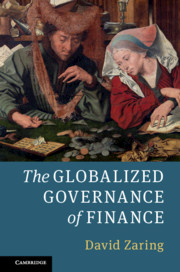Book contents
- The Globalized Governance of Finance
- The Globalized Governance of Finance
- Copyright page
- Dedication
- Contents
- Acknowledgments
- 1 A Transformative Forty Years
- 2 The Structure and Rules of the Globalized Governance of Finance
- 3 Banking, Global Oversight’s Ne Plus Ultra
- 4 Securities Regulation: Cooperation Instead of Harmonization
- 5 Cooperation in Insurance: a Slow Start, but a Fast Present
- 6 The Other Networks of Financial Regulation
- 7 International Financial Regulation and International Law
- 8 International Financial Regulation and China
- 9 The Next Financial Crisis
- Index
4 - Securities Regulation: Cooperation Instead of Harmonization
Published online by Cambridge University Press: 22 November 2019
- The Globalized Governance of Finance
- The Globalized Governance of Finance
- Copyright page
- Dedication
- Contents
- Acknowledgments
- 1 A Transformative Forty Years
- 2 The Structure and Rules of the Globalized Governance of Finance
- 3 Banking, Global Oversight’s Ne Plus Ultra
- 4 Securities Regulation: Cooperation Instead of Harmonization
- 5 Cooperation in Insurance: a Slow Start, but a Fast Present
- 6 The Other Networks of Financial Regulation
- 7 International Financial Regulation and International Law
- 8 International Financial Regulation and China
- 9 The Next Financial Crisis
- Index
Summary
Like the Basel Committee, IOSCO is committed to increasingly elaborate administrative procedures – it now uses notice and comment for almost everything substantive that it does – and to bedrock principles that underlie much of its activities. IOSCO is also committed to peer review, and has set reviewable benchmarks for its members to encourage adoption of its memorandum of understanding on enforcement cooperation. It has also stuck to its preference for consensus on the principles that it has promulgated. And while the MOU on enforcement permits a degree of “dissensus” – it facilitates the enforcement of domestic standards through the gathering of evidence from across borders, though it does not require that domestic standards be shared–it does suggest that securities watchdogs are likely enough to embrace common enough values that they are willing to assist one another in the observance of them. Moreover, IOSCO’s core principles reflect the common ground, and search for a level playing field, that marks much of international financial regulation. And the turn to bureaucratic order and legal principle is observable in IOSCO, even though it has made only modest efforts to create a global model for securities regulation.
Keywords
- Type
- Chapter
- Information
- The Globalized Governance of Finance , pp. 62 - 82Publisher: Cambridge University PressPrint publication year: 2019



